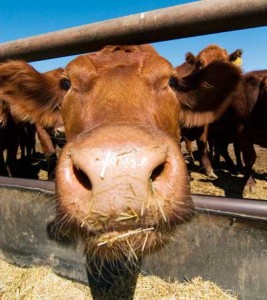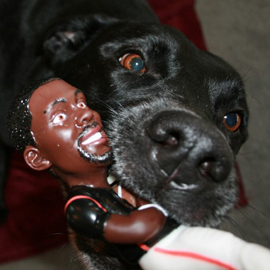 Yesterday, David Martosko of HumaneWatch published five questions for his followers to ask Wayne Pacelle at the HSUS town hall meeting in Lincoln, Nebraska. The answers are readily available at the HSUS website, Wayne Pacelle’s blogs, and in related websites.
Yesterday, David Martosko of HumaneWatch published five questions for his followers to ask Wayne Pacelle at the HSUS town hall meeting in Lincoln, Nebraska. The answers are readily available at the HSUS website, Wayne Pacelle’s blogs, and in related websites.
Using these materials, I have taken the liberty of putting together some answers that Wayne Pacelle or another HSUS employee might give to Mr. Martosko’s questions. Please note: I do not work at the HSUS and have not run these answers by anyone from that organization. These are simply my answers based on reading their materials.
1. “In 1980 at HSUS’s annual meeting, the group made it official policy to – and I quote – ‘pursue on all fronts … the clear articulation and establishment of the rights of all animals … within the full range of American life and culture.’ Is this still HSUS’s goal? If you’re trying to give so-called ‘rights’ to cows, pigs, and chickens, why wouldn’t that completely destroy the entire livestock industry?”
The HSUS works to get protections for animals. It is not so much a question of animal rights as human responsibility. Humans have the responsibility to treat animals humanely, and this includes animals raised for food, which are by far the largest percentage of animals used by humans. Unfortunately, we do not always treat farm animals humanely. This happens in two ways. First there is treatment that everyone agrees is abuse, such as what the HSUS and even a USDA inspector has uncovered at multiple slaughter plants. People were kicking calves and ramming them with electric prods, or using forklifts to move cows. Despite such violations of the Humane Slaughter Act, people at these plants were treating animals this way on a routine basis. When an inspector tried to report it, his managers demoted him and kept the plant open. In this case the laws on the books were clearly not working, and the HSUS stepped in to help bring this situation to the attention of state and federal authorities.
Second, there are standard operating procedures in industrial agriculture that are legal but which the HSUS and the general public see as inhumane. These include the intensive confinement of veal calves, pregnant pigs, and laying hens in cages so small they can’t turn around and cannot perform any natural behaviors such as rooting, nesting or perching. Most people understand that an animal needs to be able to move around and perform natural behaviors, but intensive agriculture denies these basic needs. They even deny that these animals have natural behaviors, despite the fact that they have evolved over millions of years, yet it has only been in the past few decades that we have seen widespread use of intensive confinement. This intensive confinement also leads to food safety problems such as the salmonella outbreak we saw from the DeCoster egg operations that sickened half a million people and led to the largest egg recall in our nation’s history. When animals are that stressed, they are likely to get sick. Antibiotics are not the answer, as this has only led to new forms of drug-resistant bacteria that threaten human health. The HSUS sees the answer as getting the animals out of intensive confinement and into a housing system where they can move around and express natural behaviors.
The HSUS is not out to put an end to animal agriculture as many of our opponents have charged. Their purpose is to look out for the welfare of the animals in these systems. If the Humane Society of the United States were to ignore the welfare of over 1 billion animals killed for food each year — by far the largest sector of animal use by humans — then it would not be doing its job.
2. “Can you name a specific meat, dairy, or egg brand that you and the Humane Society of the United States have endorsed?”
Sure. The HSUS supports humane and sustainable farmers like Kevin Fulton, who arranged this town hall meeting in Lincoln, Nebraska. Kevin runs a pasture beef operation in which cattle are allowed to graze freely on a natural diet of grass, which cows were evolved to eat. The HSUS is also one of 30 animal welfare groups that supports the Certified Humane label. You can see a list of Certified Humane farmers and ranchers on their website. The HSUS also supports the new Global GAP animal welfare standards, implemented just last week by Whole Foods. Again, the HSUS is not out to end animal agriculture. Its purpose is to put an end to the worst abuses on our nation’s factory farms.
3. “If you got a federal law passed that demanded a nation-wide switch to the kind of livestock production mandated by California’s ‘Proposition 2’ law, would you and HSUS be satisfied with your achievement and completely dissolve the animal-agriculture part of your organization?”
Certainly the HSUS would be thrilled to pass a law that switches the nation to a Proposition 2 type of livestock production. However, it would be irresponsible for the HSUS to ever dissolve the animal agriculture part of its organization. As stated previously, farm animals make up by far the largest percentage of animals used by humans in the United States. The HSUS would not be doing its job if it did not continue to look out for the welfare of these animals. That might consist of continuing to work for better laws to protect these animals. But it might also consist of working to see that current laws are being properly enforced. As we have seen with the Humane Slaughter Act, which the HSUS was instrumental in getting passed in 1958, our nation’s laws are not always followed, and sometimes when they are not, people in charge look the other way. So the HSUS must continue to be vigilant in making sure farm animals are treated humanely and according to the law, and that the law is being followed on farms, at auctions, in slaughterhouses, and anywhere else humans are making widespread use of these animals.
4. “Is there such a thing as meat that’s ‘humane’ enough that your ethics permit you personally to eat it? If so, where can we buy some? If not, what’s the difference between your group and PETA?”
Wayne Pacelle has not eaten meat for at least two decades, so he would likely choose not to eat meat of any sort. However, that is his choice, and not one he asks everyone to make, including employees of the HSUS. Nowhere is there a clause requiring HSUS employees to adhere to a certain diet. That is one difference between the HSUS and PETA, as PETA does require certain employees to adhere to a vegan diet. PETA also has a mission statement that precludes any use of animals by humans for any purpose. The HSUS has no such mission statement. Its mission is to celebrate animals and confront cruelty, which is what it does, whether cruelty occurs on a factory farm, at a puppy mill, or in an animal fighting operation, canned hunt, fur farm, or anywhere else.
5. “In HSUS’s Articles of Incorporation – its founding documents – you’ll find the following declaration: ‘No substantial part of the activities of the corporation shall consist of the carrying on of propaganda or otherwise attempting to influence legislation.’ Has that been changed since 1954? If not, what on earth have you been doing all these years? Isn’t your job to propagandize and influence legislation? Isn’t that what Prop. 2 in California and Prop. B in Missouri were all about?”
The Humane Society of the United States does not do direct lobbying or campaigning for candidates for political office. It does have an affiliated 501(c)(4) organization, the Humane Society Legislative Fund, that works to pass animal protection laws at the state and federal level, to educate the public about animal protection issues, and to support humane candidates for office. The HSLF tracks votes by members of Congress on animal protection issues and creates a Humane Scorecard to inform voters who care about these issues.
The HSUS has also worked with coalitions such as Californians for Humane Farms and Missourians for the Protection of Dogs to help pass ballot measures in specific states. It is certainly not the only member of these coalitions. For example, Missourians for the Protection of Dogs was also supported by the ASPCA, Best Friends Animal Society, Humane Society of Missouri, Missouri Alliance for Animal Legislation, and Tony LaRussa Animal Welfare Foundation. It was also endorsed by over 150 veterinarians and clinics, over 160 Missouri businesses, and over 100 other animal protection charities. These initiatives have broad support in the states where they have been put to a vote, sometimes winning by a landslide as in the case of Proposition 2 in California, because they are reasonable, common sense reforms that most people want to see passed.
As you can see from this blog entry, which I put together in less than an hour, the answers to Mr. Martosko’s questions are not hard to find. Unfortunately, Mr. Martosko’s purpose is not to look for fair and balanced information about the HSUS, but to destroy the HSUS by any means necessary including slander and lies so that it cannot work for welfare reforms that might threaten the profits of those who fund HumaneWatch. My question to Mr. Martosko is: When are you going to stop waging a smear campaign against the Humane Society of the United States and join the rest of the country in embracing actual animal welfare?
 In July of 2010, David Martosko made the following statement on the HumaneWatch blog:
In July of 2010, David Martosko made the following statement on the HumaneWatch blog:














 When an industry front group pretending to be a charity bashes legitimate animal welfare charities, I get annoyed.
When they try to use shelters as pawns in their smear campaign, I get furious.
Supporting shelters is admirable, and absolutely necessary to facilities strained to the breaking point. I donate to my local shelters year-round.
But HumaneWatch has managed to pervert that selfless act into a wholly selfish publicity stunt, which they’ve named “Shelter Supply Saturday”.
We call it “Whitewash Weekend”.
For the better part of a year, HumaneWatchers have been spitting on shelters and shelter personnel, while they fight spay/neuter laws, deny overpopulation, accuse shelters of profiting from their work, defend substandard breeders and animal brokers like Hunte Corp., and rail against any legislation that would ease the flood of abandoned and neglected animals into our nation’s shelters.
Now HumaneWatch is attempting to whitewash that abuse by encouraging their members to send supplies to shelters — wrapped in HumaneWatch propaganda, of course.
It will take a lot more than a dishonest greeting card to cover up HumaneWatch’s anti-animal agenda.
Shall we take a look at the scoreboard?
When an industry front group pretending to be a charity bashes legitimate animal welfare charities, I get annoyed.
When they try to use shelters as pawns in their smear campaign, I get furious.
Supporting shelters is admirable, and absolutely necessary to facilities strained to the breaking point. I donate to my local shelters year-round.
But HumaneWatch has managed to pervert that selfless act into a wholly selfish publicity stunt, which they’ve named “Shelter Supply Saturday”.
We call it “Whitewash Weekend”.
For the better part of a year, HumaneWatchers have been spitting on shelters and shelter personnel, while they fight spay/neuter laws, deny overpopulation, accuse shelters of profiting from their work, defend substandard breeders and animal brokers like Hunte Corp., and rail against any legislation that would ease the flood of abandoned and neglected animals into our nation’s shelters.
Now HumaneWatch is attempting to whitewash that abuse by encouraging their members to send supplies to shelters — wrapped in HumaneWatch propaganda, of course.
It will take a lot more than a dishonest greeting card to cover up HumaneWatch’s anti-animal agenda.
Shall we take a look at the scoreboard?
 Yesterday, David Martosko of HumaneWatch published
Yesterday, David Martosko of HumaneWatch published